Webinar series

The metaculture Webinar Series covers all of the subjects in the wiki over ten sessions, breaking it into related groups of pages, and providing thought-provoking discussion questions for each.
The discussions will be relevant to a wide range of universalist, secular humanist, atheist, and other progressive spiritual groups, and will help encourage productive dialogs between them that help build broader coalitions.
It provides a self-guided tour of the metaculture wiki useful for individuals or groups that want to use it as a template to do a systematic reading, or for discussion groups looking for new topics. It's broken into ten groups, but some have more material than others. Spend more time on the topics of interest to you or your group, don't use this guide to impose artificial time limits.
You can also just hit Random page and let the universe pick your next topic of conversation!
Check the Sunday Nomads Meetup Group for local events in East Tennessee that our mods and friends plan to participate in.
The Church Research page has reviews of various regional religious services we have visited, and some other events that have induced spiritual experiences.
The ISNESS is a model for a modern major interfaith activity and discussion group centered around the intersection of science, psychology, psychedelics, and religion.
Sign up here to receive updates, reminders, and meeting links for future webinars and live events.
1 Introduction

Start with an introduction to the metaculture belief system, explaining the primary goals, expected benefits, and reasons behind the undertaking.
- metaculture
- Metanarrative of Everything
- Connections
- Belief System
- Culturally Neutral
- Universal In-Group
- Holistic Perspective
- Persuasive Power
- Necessary Prerequisites
- The Dogma of No Dogma
- Enlightenment and the Meaning of Life
- Why a wiki?
Ponderin' Questions
- Is there any single work that reflects your beliefs as a whole? Or a significant portion?
- Are there any other goals for society that should be prioritized enough to list on the home page?
- Is science culturally neutral? Can it be?
- How does the Paradox of Tolerance impact the goal of creating a universal in-group?
- Is it intellectually honest to take a position or perspective due to its superior persuasive power?
- What are the most important concepts required to understand the secular humanist perspective?
- Is it possible to codify beliefs without them becoming dogma?
- What is the meaning of life?
- Have you ever edited a Wikipedia page? Which ones?
2 Metaphysics and Theology
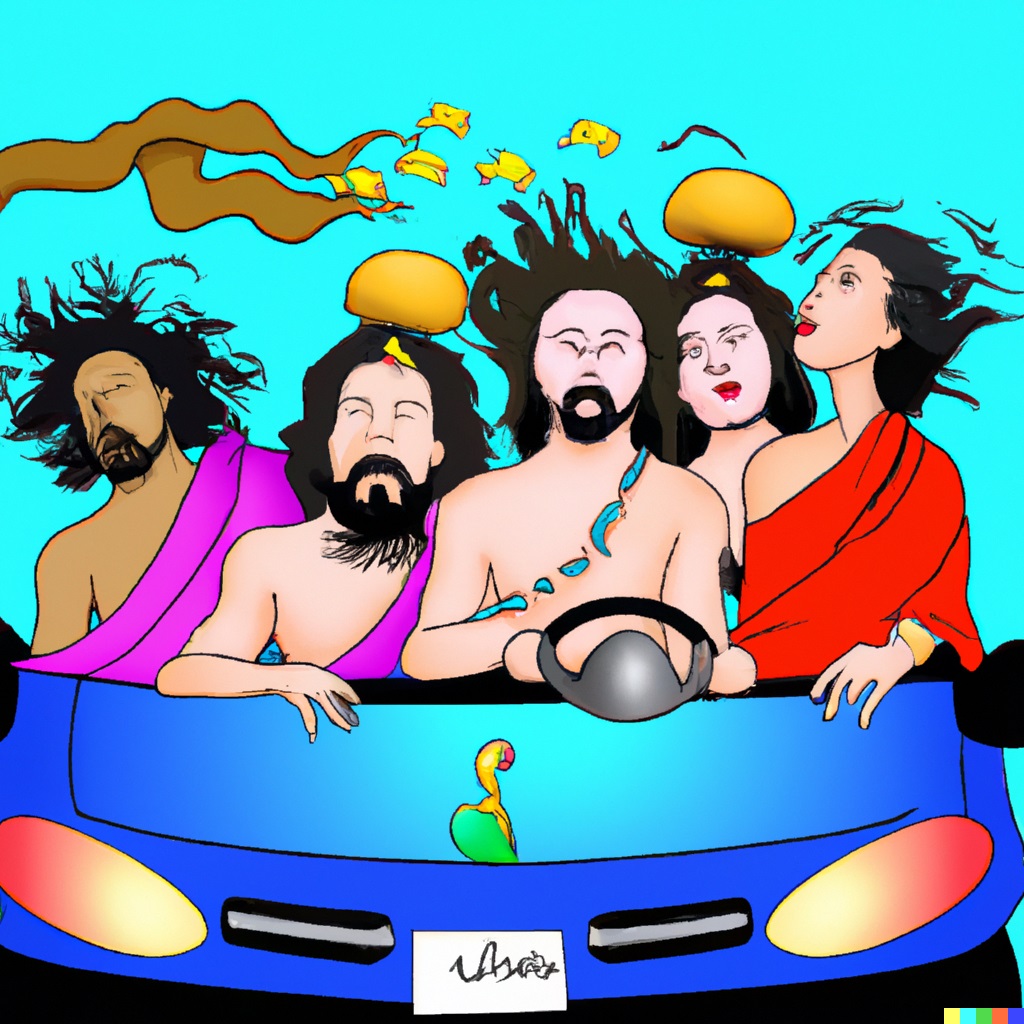
Since one of the primary goals is the resolution of cognitive dissonance caused by science and religion, the metaphysical and theological assumptions are a logical place to start.
- Philosophy
- Religion
- Science, Reality and the Laws of Physics
- Logic and Inevitability
- Atheism, Literalism, and Allegory
- Faith, Life Choices, and The Gambler
- God, Optimism, and the God Concept
- Pantheism
- Universalist and Universe
- Fractal Geometry of God
Ponderin' Questions
- Are there any other social or psychological functions of religion not mentioned here?
- Do you consider some aspects of reality to be inevitable (must be)? Which ones?
- Does belief in the supernatural have any impact on your life choices if the laws of physics are never violated?
- What are examples of faith-based beliefs that are still required in a secular belief system?
- Do you think it is likely that we live in a simulation?
- How do you define god?
- What are some other examples of modern god concepts?
- What are some other functions, principles, or truths that are universal to all religions?
- Are there any aspects of god not found in the universe itself?
- Aren't fractals awesome?
3 Empirical Ethics
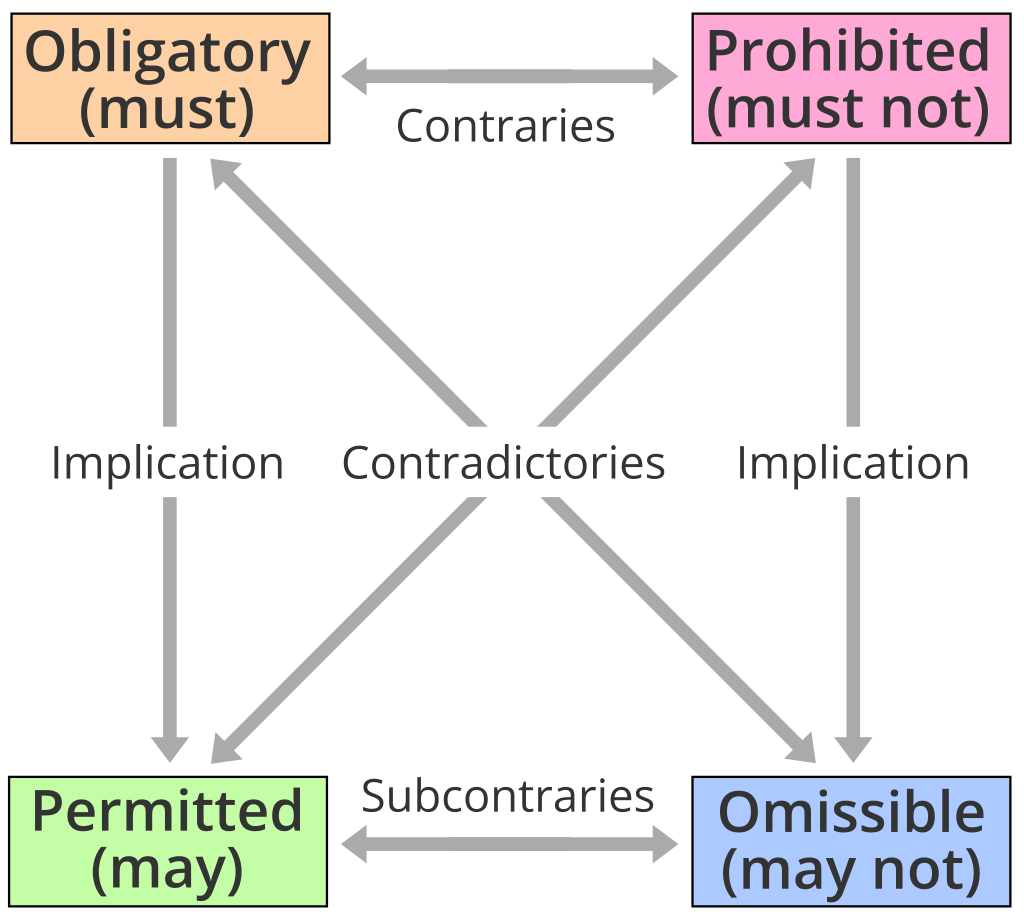
The goal of our ethics and what humans consider "good" is encoded in our brains by evolution. Therefore, the pursuit of happiness and well-being is the objective goal of our actions.
The way we interpret these instincts becomes the generating equation that creates the pattern of our life choices.
- Utilitarian Ethics and Consequences
- Happiness and well-being and Meaning
- Theoretical People
- Quality of life versus quantity of life
- Abortion, Euthanasia and the Death penalty
- Moderation
- Altruism
- Authority
- These things are bad, mkay?
Ponderin' Questions
- Can you conceive of another ethical system besides utilitarianism whose results could be studied empirically?
- Is "happiness and well-being" an accurate description of our psychological goals?
- How much weight should future generations have in our ethical calculus? How many generations should be considered?
- Are there other fundamental ethical dichotomies besides quantity of life versus quality of life?
- What do you find to be the most persuasive argument for your position on abortion, euthanasia, or the death penalty?
- What are your personal strategies for avoiding excessive indulgence?
- What other kinds of behavior would your version of god's commandments forbid?
4 Gödel, Feedback Loops and Fractals

When self-reference is introduced into any mathematical system, strange (loop) things start to happen.
- Gödel's Incompleteness Theorems
- Algorithm
- Recursion
- Feedback Loops
- Self-Organization
- Generating Equation
- Self-Similarity
- Self-Correction
Ponderin' Questions
- Do you really understand Gödel's Incompleteness Theorems or do you just say you do?
- Does Al Gore have rhythm? How much responsibility can he legitimately claim for the invention of the internet?
- Will algorithmic thinking become a core skill or will it be replaced by AI?
- What are some other examples of feedback loops in nature?
- What are some other examples of feedback loops in society?
- How does Gödel's Incompleteness Theorems relate to the Paradox of Tolerance?
- How is the nature of truth like the border between 0 and infinity of the Mandelbrot set? Or the coastline of England?
- What is an example of a belief, social norm, or law in society that has led to some unintended consequence due to the "butterfly effect"?
- How does self-similarity reduce the amount of information required to encode natural designs?
- How has the principle of self-correction been implemented in some system that you know about?
5 Consciousness and the Mind/Body Relationship
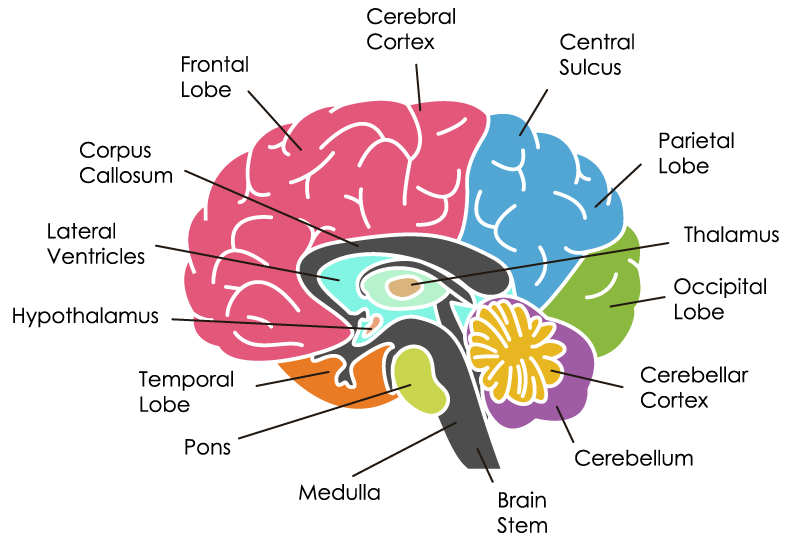
A crash course in how the brain works, with a particular emphasis on the hard problem of consciousness, the mind/brain relationship, and how understanding the activity of neural networks can help us understand our own behavior.
- Brain and Neurophysiology
- Neural networks
- Consciousness and Mind
- Language
- Humor
- Free Will
- Subjectivity
- Psychedelics
Ponderin' Questions
- Do you believe that the mind is purely material? Or is it something separate?
- What activities put you in a flow state? When do you feel most mindful?
- Does the universe have consciousness?
- Do you believe we have free will? Can we control our actions with our thoughts?
- What is a time you have changed your environment to aid your willpower?
- Do you believe in the similarity of subjective experiences? Is your perception of color the same as others?
- What is your solution to the hard problem of consciousness?
6 Brain and Behavior
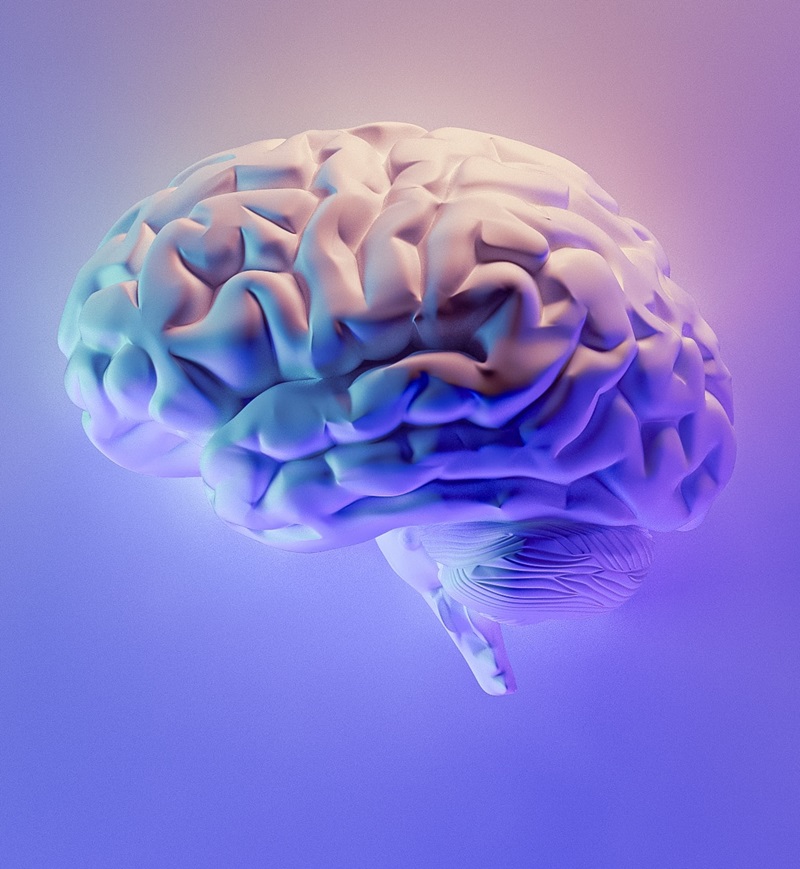
Exploring the other areas related to psychology, with a particular emphasis on the things that determine our life choices and behaviors.
- Self-Awareness
- Cognitive Dissonance
- Motivational Salience
- Addiction
- Delayed Gratification and Temptation
- Lying/Cheating
- Emotions
- The Placebo Effect
Ponderin' Questions
- At what point in our development do we truly become self-aware?
- Are animals self-aware? Which ones?
- What are some examples of modern conflicting ideas that cause the most cognitive dissonance?
- What is an example of a time when you had cognitive dissonance and how was it resolved?
- What is the thing with the most motivational salience to you?
- Is there a habit that you have tried to quit? Were you successful? What strategy did you employ?
- When was a time that delaying gratification paid off for you?
- What temptation is your weakness? What do you do to mitigate that?
- What's your favorite emotion other than happiness/joy? What is your least favorite?
- What is a strategy you employ to break out of a negative emotional state?
- Have you ever been cured by a placebo?
- Can the placebo effect be elicited using rituals?
- If you had to create a new placebo ritual, what would it be?
7 Creation, Evolution, and Metaphor Mapping
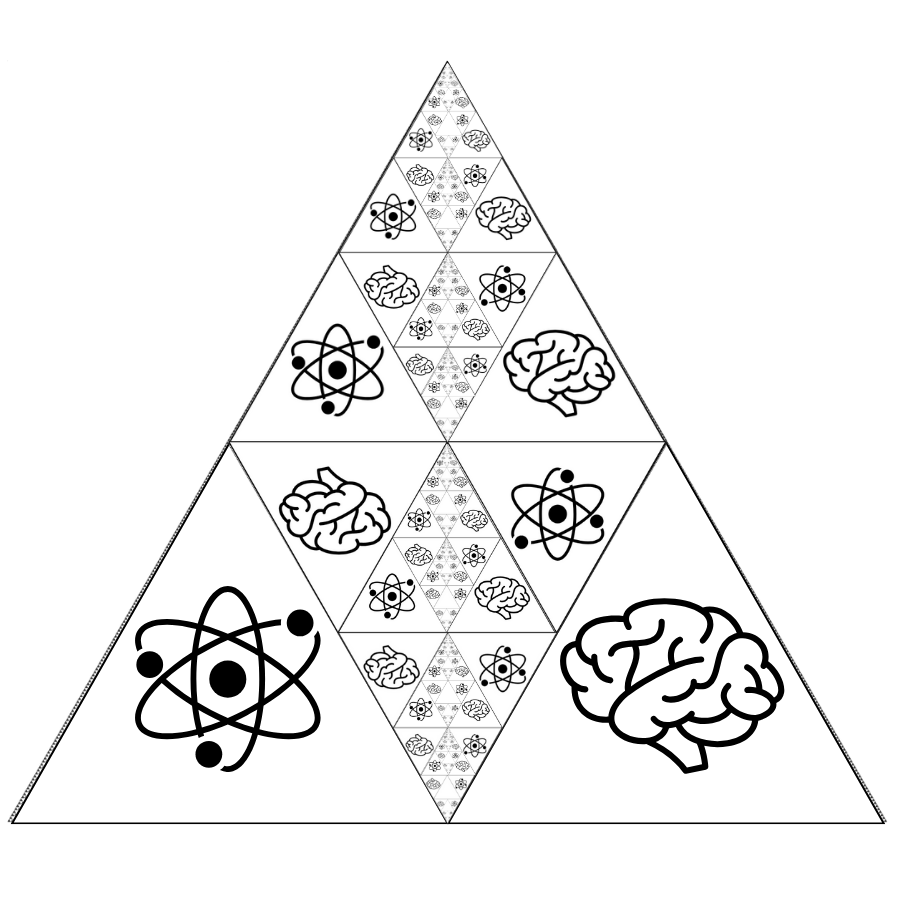
Exploring how the application of the fractal metaphor and principles of self-organization can help people understand the nature of complex systems like evolution, as well as illustrating the natural analogs for spiritual allegories.
- Literalism and Allegory
- Metaphor Mapping
- Creation Story
- Evolution and Self-replication
- Spirit as Emergence
- Afterlife
- Heaven and Hell
- Apocalypse Prevention
- Sierpinski Trinity
- Stochastic Manifestation and Karma
Ponderin' Questions
- Do you think that most self-described scriptural "literalists" truly believe it absolutely? Or would the necessity of interpretation ultimately be acknowledged when pressed on the issue?
- What is your favorite creation myth?
- Is it intellectually honest to say that the big bang and evolution is "how god did it"?
- What are the key concepts required to understand evolution that are not explained in school? What are the gaps in creationist understanding?
- Is there a psychological benefit to the belief in the continuity of consciousness and self-awareness after death?
- Were heaven and hell originally meant to be allegories for states of mind or were they meant to be literal?
- Are you starting to feel the holy spirit of the fractal universe?
8 Flavors of Modern B.S.
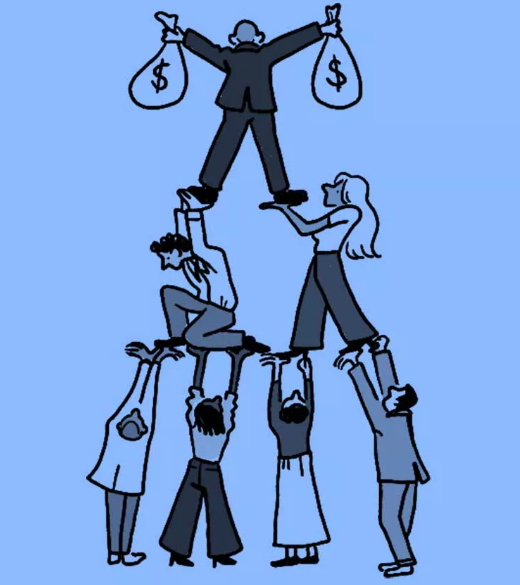
Reason and critical thinking are vital skills in late stage capitalism, where you can be grifted by anyone in the world at any time, and many of the schemes are legal. Developing new social norms will be necessary to counter these trends.
- Misinformation, Outrage, Platforms and Promotion
- Grift
- Pseudoscience and Contrarianism
- Quantum Woo
- Futurology, Technology, and Crypto-bros
- The Manosphere
- Jesus Christ and Jordan Peterson
- Secular Gurus
- Critical Thinking
- Social Norms and Taboos
Ponderin' Questions
- What impact would an AI-optimized newsfeed algorithm that maximizes happiness reactions have on society?
- What would you change about he nature of online discourse if you could change one thing?
- What form of modern grift not mentioned here should be added to the list?
- What pseudoscientific belief is your personal pet peeve?
- Are there other scientific fields besides Quantum Mechanics that lend themselves to pseudoscience and woo?
- How can secular progressive philosophy appeal to the adolescent male mind?
- How does Jordan Peterson and the manosphere manage to appeal to young men more than any progressive philosophy?
- Is it possible to avoid in-group bias in the application of critical thinking?
- What new taboos are required to maintain the social order in the future?
9 Politics, Government and Economics

Evidence-based best practices for creating a society that is effective at maximizing happiness and well-being for its citizens and fulfilling the utilitarian ethos.
- Not left and right: Progressive, Libertarian, and Authoritarian
- Fascism and Communism
- Democracy
- Defining and Defending Freedom
- Freedom of Speech
- Religious Freedom
- Balance of Power
- Separation of Church and State
- Public Education
- Social Safety Net
- Universal Health Care
- Equal Justice for all citizens
- Mixed Economy with the best elements of Socialism and Capitalism
Ponderin' Questions
- Are there any third way or fourth way political orientations that are not covered in the modern political compass?
- Is it ever ok to not punch a fascist?
- How do utopian visions of future societies lead to genocide?
- Is the limitation of freedom that does not harm another person ever justified?
- How does the Paradox of Tolerance impact your views on freedom of speech?
- Do the values of a liberal, progressive society necessarily infringe on the religious liberty of traditionalists?
- What power structures in modern society are out of balance?
- Do European countries that lack an absolute Separation of Church and State suffer from religious intolerance or indoctrination?
- Can you explain the US student loan system in a way that someone who does not know their socioeconomic position at birth would choose it?
10 Best Practices For Life

The rest of the webinar series will focus on the application of science and evidence to maximizing happiness and well-being in society to every aspect of future culture. When the best practices section has been fully developed, each of these bullets could become its own session.
For the initial webinar, it will focus on the need to develop an authoritative guide for making effective life choices that is continually updated based on the best available evidence, so people don't have to figure everything out for themselves amidst a sea of misinformation.
- Evidence-Based Best Practices
- Life and Life Choices
- Mental Health
- Spirituality
- Relationships
- Community
- Time
- Work
- Finance
- Music
- Art
- Food
- Love
- Sex
- Children
- Longevity
- Death
- Afterlife
Ponderin' Questions
- What fields have well-established best practices?
- Which fields really need best practices but don't have them?
- Which ones would be very difficult to apply evidence-based best practices and why?
- What other aspects of life should be covered in the above list but aren't?
- What should be included in the evidence standards that would trigger a major revision to a recommendation?
- What should determine the most important facts that need to be covered for each subject to avoid information overload?
- How can the diversity of culture and methods for finding happiness be celebrated throughout to avoid any tendency towards homogenization?